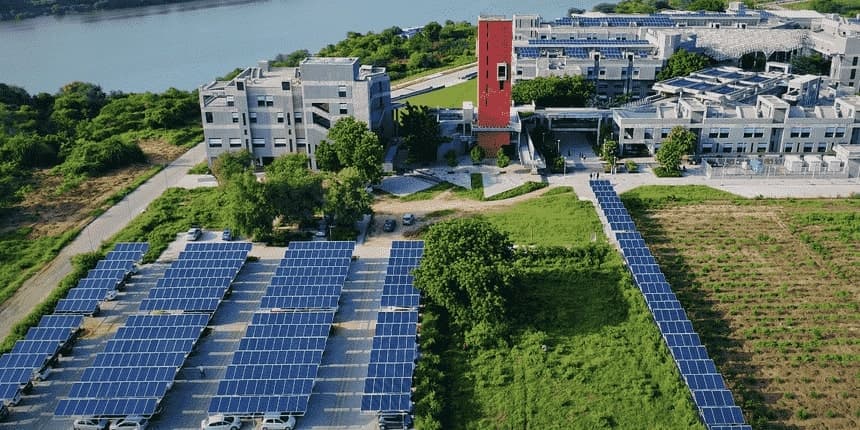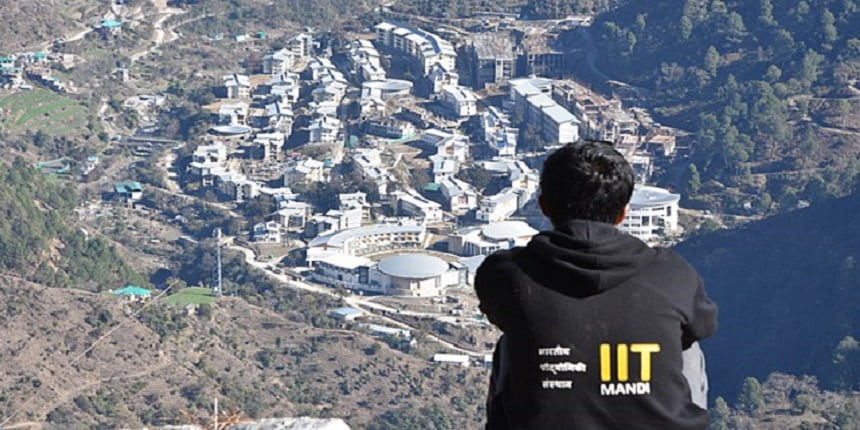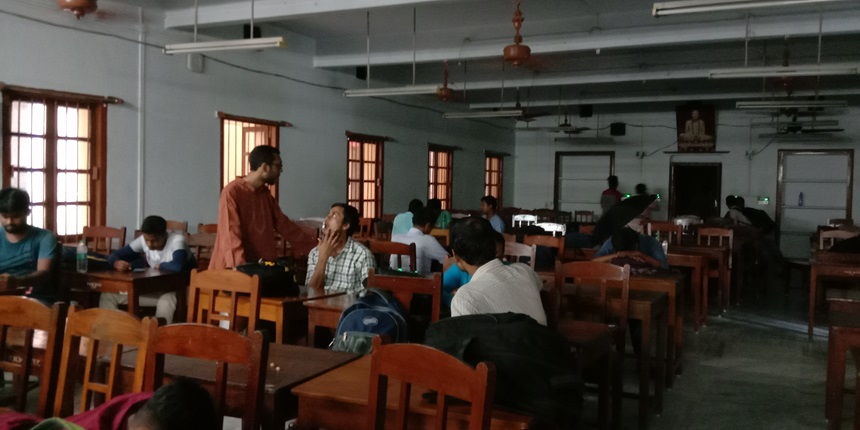New Jobs: Green energy, waste management jobs to grow by 30 million by 2030, says report
Green Jobs: ‘Delhi, Mumbai, Bengaluru generating the most demands; India has potential to generate 35 million green jobs by 2047’
 Solar panels at IIT Gandhinagar. (Image: By Special Arrangement)
Solar panels at IIT Gandhinagar. (Image: By Special Arrangement)Shradha Chettri | March 23, 2024 | 03:30 PM IST
NEW DELHI: The global green transition is expected to generate over 30 million jobs by 2030, states the World Economic Forum’s report, Global Risk Report 2024. Further, a domestic report titled Gearing up the Workforce for a Green Economy highlighted that India has the potential to create 35 million green jobs by 2047.
The traditional sectors which are looking towards transitioning to green energy and the new emerging sectors should be the field to tap and focus on in the coming years, state recruiters, and officials working on skilling.
What are green jobs?
The International Labour Organisation (ILO) defines green jobs as “decent jobs that contribute to preserving or restoring the environment, whether in traditional sectors like manufacturing and construction, or in new, emerging green sectors such as renewable energy and waste management”.
The key sectors include renewable energy – such as solar, wind, biofuels, green hydrogen – waste management, waste-water management, electric vehicles, sustainable textiles, and green construction.
The Indian report, produced jointly by Sattva Consulting and Skill Council for Green Jobs (SCGJ), with support from JP Morgan, in May 2023, also highlighted the prospective growth of the different sectors. The SCGJ is a non-profit, industry-led society, whose mission is to identify skilling needs within the green businesses sector.
“Solar energy is projected to host 3.26 million jobs by 2050, followed by wind energy, which is expected to support 0.18 million jobs by 2030. Moreover, the bioenergy and green hydrogen sectors are predicted to create 0.27 million and 0.6 million green jobs by 2030, respectively,” stated the report.
Managing e-waste is estimated to create 0.5 million formal jobs in India by 2025, while the wastewater management sector, which currently employs 0.71 million people, is anticipated to require a large number of skilled workers in the next decade.
“The automotive, construction, and textile sectors are leading the way in India’s green transition, through electric vehicles (EVs), green construction, and sustainable textiles and apparel. The growth of EVs is expected to create 10 million direct and 50 million indirect jobs by 2030. Solar energy sector is projected to have 3.26 million jobs by 2050.56,” the report adds.
Also read Dharmendra Pradhan launches new project in Odisha to empower youth; increase employability
Green jobs: Different roles
The job roles under it are varied requiring different levels of skill and training. For instance, in EV and clean transportation, job roles include solar charging operator and battery swapping operator. In green buildings, job roles could be of an energy efficient building designer and green building material sourcing manager. The renewable energy sector needs installation, operation and maintenance technicians, biomass plant or biofuel production operators and others.
“The job roles have already been identified and it is now our responsibility to train and skill the workforce. Transition towards green energy is prime for us to become global leaders, to move towards energy security and become self-sufficient,” said Suhas Deshmukh, director, monitoring, at National Council for Vocational Education and Training (NCVET). The council is the national regulator for setting standards, developing comprehensive regulations, and improving the vocational education, training, and skilling ecosystem.
Green energy: Demand increase
Another report, titled Green Industry Outlook: Paving the Way for Sustainable Future, by TeamLease Digital, released in October 2023, highlights that job searches for sustainability roles have increased by 31% between April 2022 and 2023, with a 13% overall growth in interest over the last three years.
The top cities generating the most demands for green jobs include Delhi, Mumbai and Bengaluru. Bengaluru reported a year-on-year-growth of 1,749%.
Sachin Alug, CEO, Next Level Business (NLB) Services, said: “The green job market growth in India has been evident from the training and recruitment strategies adopted by organisations that are expected to boost job growth by over 20% in the coming years. As listed by the World Economic Forum, organisations can leverage nearly 600 green skills to drive their environment-focused goals. ” NLB Services is a digital and technology talent solutions provider with headquarters in the US.
Also read AI skilled workers will see 54% salary hike; finance, IT sectors to benefit most: Amazon study
Green skills, new courses
The SCGJ report states, “Firstly, while the demand for emerging green jobs is expected to grow, the supporting ecosystem to provide the skill-sets required for these jobs is currently nascent. India needs to establish a scalable skill infrastructure that can provide high-quality training in line with industry demands.”
The SCGJ said that it has trained one million candidates so far but the requirement is much higher. The NCVET is putting plans in place as well.
“NCVET has already designed a Green Energy Capacity Building Framework and identified the energy sources which need to be the focus,” explained Deshmukh. “Not just the sector councils, but to develop various skills sets work is also ongoing with the Indian Institutes of Technology [IIT] – which are going to look into the research and development part – the institutions regulated by the All India Council for Technical Education and Training (AICTE) and even with University Grants Commission (UGC) to start courses in the undergraduate and postgraduate levels. We are even looking at micro-credentials and nano-credentials to upskill the workforce already part of the system.”
At the undergraduate or BTech level, there are suggestions to start foundation and elective courses in energy. “We are suggesting energy-related projects, specialisation courses in green energy, biofuels and internships in energy companies in the final years of the study,” added Deshmukh.
Also read Over 7% colleges achieve full placement; 60% students prefer job security over hike: Report
Green skills and gaps
The SCGJ report includes a survey conducted among 2,328 candidates across five metro cities which revealed that 85% of them had heard about green or climate-positive jobs but only 35% knew of specific roles and skilling programmes.
In terms of specific sectors, only a handful of institutions, such as the National Institute of Wind Energy (NIWE), Mahatma Gandhi Institute of Rural Energy and Development (MGIRED) and the Technology Informatics Design Endeavour, offer specialised training. “Courses are yet to be developed for manufacturing,” added the report.
Even industry experts highlight the gap and the urgent need to bridge them. Varun Gupta, head of D2C sales, Hero Vired, said: “In India, there's a gap between what colleges teach and what jobs require….There are hurdles like the absence of policies for green skill development, lack of funds, and inadequate infrastructure.…To overcome these challenges, we need educational reforms to match academic programmes with real-world needs, offer internships, focus on practical learning and soft skills.” Hero Vired offers online certificate courses for professionals.
Alug adds, “Academic curricula haven’t yet managed to keep up with the rapidly-changing world of green skills. Due to the gap between academic knowledge and job requirements, businesses are adopting apprenticeship models and on-the-job training options for young employees.”
Edtech trying to fill the gap
Raghav Gupta, managing director, India and APAC at Coursera, states, “We’re seeing large-scale skilling efforts by governments, enterprises, universities and individual learners to build capacity and invest in the critical skills.”
The learning platform has seen a surge in demand for courses around sustainability. For example, the course on Sustainable Development in the 21st Century with Ban Ki-moon by Yonsei University, South Korea, has seen a 200% growth from 2022 to 2023. Similarly, “Global sustainability and corporate social responsibility: Be sustainable” by Macquarie University, Australia, has seen 155% growth.
Educational institutions state that there are efforts being made to work towards and tap the prospects in green jobs.
Dhruv Galgotia, CEO, Galgotias University, said, “Recognising the rapid evolution in the green sector, our university continuously assesses and updates its curriculum to minimise the gap between academic knowledge and industry requirements. This is achieved through regular consultations with industry experts, alumni feedback, and participation in industry forums. Additionally, we offer hands-on training, internships, and project-based learning opportunities to ensure our students gain practical experience alongside their academic studies.”
If you want to share your experience at work, talk about hiring trends or discuss internships, write to us at theworkplace@careers360.com. To know more about The Workplace itself, here's a handy note: Let’s talk work…
Follow us for the latest education news on colleges and universities, admission, courses, exams, research, education policies, study abroad and more..
To get in touch, write to us at news@careers360.com.




